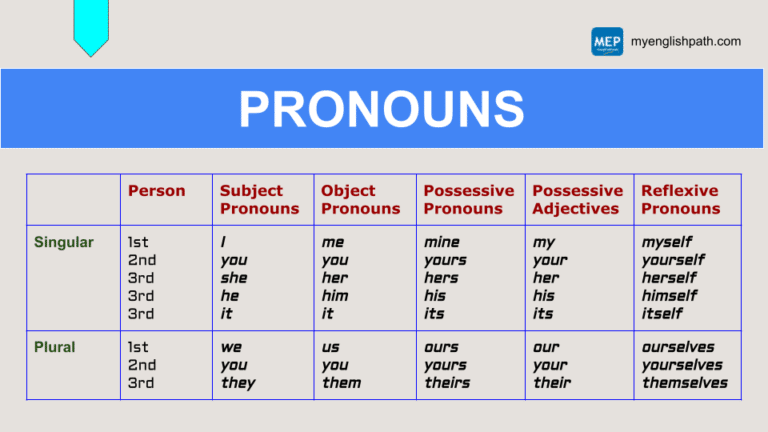How to Easily Transform Your Child into a Confident and High-achieving Reader With No Stress, in Just 10 Minutes a Day!
Table of Contents
Introduction
Pronouns are words used in place of nouns in sentences.
The noun that a pronoun refers to is called the “antecedent.”
In the following sentence, the pronoun it refers to the antecedent noun museum.
- We visited the museum. It was spacious and had a lot of attractions.
There are different types of pronouns.
Let’s explore these types and give examples to explain them.
Personal pronouns

Subject pronouns
Subject pronouns (I, you, she, he, it, we, you, they) are used in place of the subject of a sentence.
- I am reading an interesting book. (I always refers to the speaker. In writing, it is always written in uppercase.)
- I enjoyed reading this book. It is about space tourism. (The pronoun It is the subject of the second sentence and it refers to the “book.”
- The children are going to school. They are excited about the new school year. (The pronoun “They” is the subject of the sentence, and it refers to the “workers.”
Object pronouns
Object pronouns (me, you, her, him, it, us, you, them) are used in place of the object of a verb or preposition.
- The teacher asked me to rewrite the assignment. (The pronoun me is the object of the verb asked.)
- Susie will visit us tomorrow. (The pronoun us is the object of the verb visit.)
- The employees didn’t like the way their boss spoke to them. (The pronoun them is the object of the preposition to.)
Possessive pronouns
Possessive pronouns (mine, yours, hers, his, its, ours, yours, theirs) express possession (or belonging).
A possessive pronoun is not followed by a noun.
- Whose bag is this? It’s mine. (The pronoun mine refers to the bag, and it indicates that the bag belongs to me – the speaker)
- I didn’t like the laptop I bought. Yours is better. (The pronoun yours refers to the laptop, and it indicates the laptop belongs to you.)
- He took my notebook and I took his. (The pronoun his refers to the notebook, and it indicates that it belongs to him.)
Note:
We don’t use an apostrophe (‘) with possessive pronouns like we do with possessive nouns.
Compare:
- This is Layla’s shirt.
- This shirt is hers.
Possessive adjectives
Possessive adjectives, also called possessive determiners, (my, your, her, his, its, our, your, their) express possession (or belonging).
A possessive adjective is different from a possessive pronoun in that it must be followed by a noun.
- Whose bag is this? It’s my bag.
- I didn’t like the laptop I bought. Your laptop is better.
- He took my notebook, and I took his notebook.
Notes:
We avoid using its as a possessive pronoun except when it is followed by the word own.
- Each of these accounts has a password of its own.
(Check out the difference between its and it’s here.)
Reflexive pronouns
Reflexive pronouns (myself, yourself, herself, himself, itself, ourselves, yourselves, themselves), like object pronouns, are used as objects of verbs or prepositions.
A reflexive pronouns is used in place of the object when the subject and the object refer to the same person or thing.
- I looked at myself in the mirror.
- She blames herself for what happened.
- We can take care of ourselves.
Notes:
In some cases, the object pronoun, not the reflexive pronoun, is used after the preposition even though the subject and the object are the same person.
- I took my luggage with me.
- They kept their luggage next/close to them.
When we add by before the reflexive pronoun, it means “alone.”
- She organized the party by herself.
When we want to emphasize the subject, we can use a reflexive pronoun after the subject or at the end of the clause.
- He himself fixed the broken bike.
- He fixed the broken bike himself.
⇔ Try this quiz on reflexive pronouns.
Impersonal pronouns
The pronouns one and, you are used as impersonal pronouns when they refer to “any person” or “people in general.”
One is more formal than you.
- One should always be optimistic.
- How do you personalize your phone?
The pronoun they is used in informal situations to refer to “some people” or “somebody.”
- They changed the app settings. (They refers to the app developer/s.)
Indefinite pronouns
Indefinite pronouns (pronouns that end with -body, -one, -thing, -where) are used to refer to people, things or places in general.
They are:
everybody, somebody, anybody, nobody
everyone, someone, anyone, no one
everything, something, anything, nothing
everywhere, somewhere, anywhere, nowhere
(Notice that no one is the only pronoun that is written in 2 separate words. It can also be written with a hyphen no-one.)
Singular verbs are used with these pronouns. (Check out subject-verb agreement.)
- Everyone is ready for the new mission.
- No one wants more trouble!
- Is there anything wrong with the machine?
Similar More links About Pronounce In English